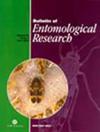转运蛋白(TSPO)可抑制蚕蛾鼻疽的增殖
IF 1.6
3区 农林科学
Q2 ENTOMOLOGY
引用次数: 0
摘要
由诺瑟玛蝇(Nb)感染家蚕引起的蚕病(Pebrine disease)是一种长期存在的严重疾病,威胁着养蚕业。作为寄生性病原体,小孢子虫与其宿主之间在线粒体水平上存在着复杂的关系。以往的研究发现,转运蛋白(TSPO)参与多种生物功能,如膜电位调节、线粒体自噬、免疫反应、钙离子通道调节和细胞凋亡等。在本研究中,我们发现蚕感染 Nb 后 TSPO(BmTSPO)的表达上调,导致细胞质钙、三磷酸腺苷和活性氧水平升高。敲除和过表达 BmTSPO 分别会促进和抑制 Nb 的增殖。我们还证实,过表达 BmTSPO 会促进宿主细胞凋亡,并显著增加参与免疫缺陷和 Janus 激酶-信号转导和转录激活通路的基因的表达。这些发现表明,BmTSPO 可激活家蚕体内的先天免疫信号通路,从而调节 Nb 的增殖。以 TSPO 为靶标是开发治疗微孢子虫感染的新方法的一个可行途径。本文章由计算机程序翻译,如有差异,请以英文原文为准。
Translocator protein (TSPO) inhibits Nosema bombycis proliferation in silkworm, Bombyx mori
Pebrine disease, caused by Nosema bombycis (Nb ) infection in silkworms, is a severe and long-standing disease that threatens sericulture. As parasitic pathogens, a complex relationship exists between microsporidia and their hosts at the mitochondrial level. Previous studies have found that the translocator protein (TSPO) is involved in various biological functions, such as membrane potential regulation, mitochondrial autophagy, immune responses, calcium ion channel regulation, and cell apoptosis. In the present study, we found that TSPO expression in silkworms (BmTSPO ) was upregulated following Nb infection, leading to an increase in cytoplasmic calcium, adenosine triphosphate, and reactive oxygen species levels. Knockdown and overexpression of BmTSPO resulted in the promotion and inhibition of Nb proliferation, respectively. We also demonstrated that the overexpression of BmTSPO promotes host cell apoptosis and significantly increases the expression of genes involved in the immune deficiency and Janus kinase-signal transducer and the activator of the transcription pathways. These findings suggest that BmTSPO activates the innate immune signalling pathway in silkworms to regulate Nb proliferation. Targeting TSPO represents a promising approach for the development of new treatments for microsporidian infections.
求助全文
通过发布文献求助,成功后即可免费获取论文全文。
去求助
来源期刊
CiteScore
4.00
自引率
0.00%
发文量
160
审稿时长
6-12 weeks
期刊介绍:
Established in 1910, the internationally recognised Bulletin of Entomological Research aims to further global knowledge of entomology through the generalisation of research findings rather than providing more entomological exceptions. The Bulletin publishes high quality and original research papers, ''critiques'' and review articles concerning insects or other arthropods of economic importance in agriculture, forestry, stored products, biological control, medicine, animal health and natural resource management. The scope of papers addresses the biology, ecology, behaviour, physiology and systematics of individuals and populations, with a particular emphasis upon the major current and emerging pests of agriculture, horticulture and forestry, and vectors of human and animal diseases. This includes the interactions between species (plants, hosts for parasites, natural enemies and whole communities), novel methodological developments, including molecular biology, in an applied context. The Bulletin does not publish the results of pesticide testing or traditional taxonomic revisions.

 求助内容:
求助内容: 应助结果提醒方式:
应助结果提醒方式:


